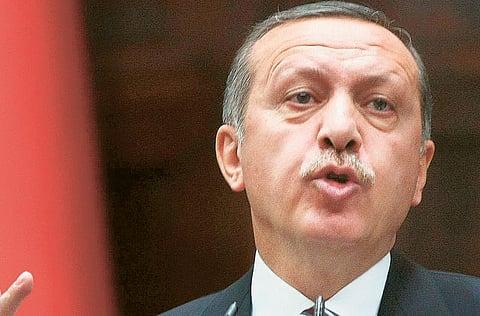Turkey condemns UN inertia over Syrian conflict
Erdogan says Security Council inaction encouraging Al Assad

Istanbul: Turkish Prime Minister Tayyip Erdogan rebuked the UN Security Council for inaction over Syria on Saturday as war intensified across the country, saying the world body of superpowers was repeating mistakes that led to massacres in Bosnia in the 1990s.
President Bashar Al Assad’s forces used air strikes and artillery to bombard insurgents on several fronts in the 19-month-old conflict, which risks dragging in regional powers with no sign of a diplomatic breakthrough.
Turkey — increasingly entangled after having intercepted a Russian airliner carrying what it said were Russian-made munitions for the Syrian army, infuriating Moscow and Damascus — has led calls for intervention, including no-fly zones enforced by foreign aircraft to stop deadly air raids by Al Assad’s forces.
But there is little chance of United Nations support for robust action given the opposition of veto-wielding Security Council members Russia and China.
“The UN Security Council has not intervened in the human tragedy that has been going on in Syria for 20 months, despite all our efforts,” Erdogan told a conference in Istanbul attended by dignitaries including Arab League Secretary General Nabeel Al Arabi. “There’s an attitude that encourages, gives the green light to [Al] Assad to kill tens or hundreds of people every day.”
The bloodshed has worsened markedly in the past two months although neither side has been able to gain a distinct advantage, with government force relying heavily on air power and artillery to batter the rebels.
Combat has been reported nationwide but the crucial strategic battles are being fought in an arc through western Syria, where most of the population lives.
The government dispatched warplanes to attack insurgent forces surrounding the Wadi Al Dayf military barracks near Maarat Al Numan in Idlib province, wounding 22 rebels, the Syrian Observatory for Human Rights said.
The rebels captured Maarat Al Numan this week, cutting the main north-south highway linking Damascus, Homs and Aleppo, and government forces will need to retake it in order to reinforce and resupply Aleppo — Syria’s largest city and commercial hub.
Memories of Srebrenica
The UN Security Council, divided between Western powers on one side and Russia and China on the other, has proved helpless in halting a conflict which has spiralled into civil war and killed more than 30,000 people.
Erdogan said a system which allowed one or two nations to block intervention in such a massive humanitarian crisis was inherently unjust, and that Syria would go down in history as a UN failure much like Bosnia in the 1990s.
“How sad is that the United Nations is as helpless today as it was 20 years go when it watched the massacre of hundreds of thousands of people in the Balkans, Bosnia and Srebrenica,” Erdogan told the Istanbul conference.
The July 1995 massacre in Srebrenica was the worst on European soil since the Second World War, in which Dutch UN peacekeepers abandoned what had been designated a UN safe haven to advancing Bosnian Serb forces, who then killed 8,000 Muslim men and boys and bulldozed their corpses into pits.
Elsewhere on Syria’s battlefronts on Saturday, government forces rained mortar fire down on the opposition-held Khalidiya neighbourhood of the city of Homs, the Observatory said. Explosions were felt throughout the besieged district.
To the south of Damascus near Daraa — cradle of the uprising which began with peaceful street rallies — Al Assad’s troops and rebels were fighting on the edge of the town of Maarba.
After four days of heavy fighting in and around the town of Azmarin on the Turkish border, the rebels appeared to have a fragile hold.



